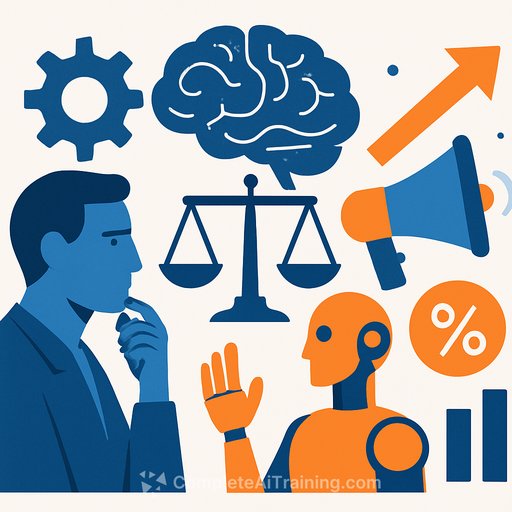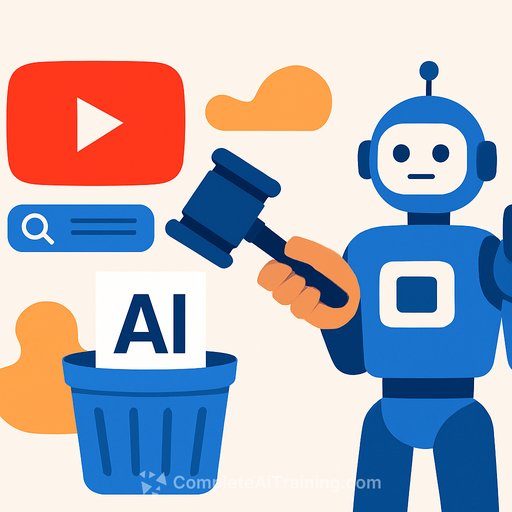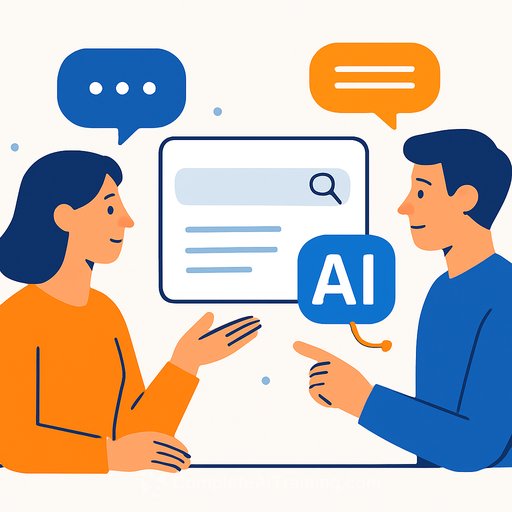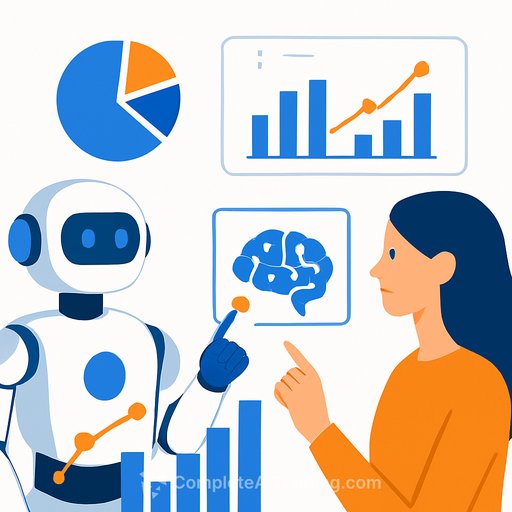If everyone automates, who still thinks? AI agents and the future of marketing
AI agents are moving from helpful assistants to autonomous operators. They launch campaigns, shift budgets, update CRMs, and post content without waiting for your prompt. That flips marketing from manual execution to managed systems. With that autonomy comes risk - brand misfires, data exposure, and creativity going stale.
The edge won't be who automates first. It will be who governs best and thinks deeper. Strategy, creativity, and ethics become the high-leverage work as agents take care of the doing.
From tools to team members
Most of us started with Custom GPTs for ideas, research, and copy. Useful, but reactive. Agents don't wait - they act - connecting CRMs, ad platforms, and analytics to run workflows end to end. In short: GPTs help you think. Agents help you do.
How agents are already running marketing
- Campaign execution and reporting: Zapier AI Actions, LangChain Agents, and ChatGPT Workflows can launch Google Ads, post to LinkedIn, and update dashboards. HubSpot AI Agent and ActiveCampaign AI Automation reallocate spend and rewrite ads based on live performance.
- Content and creative workflows: Jasper Campaigns, Writer.com, and Notion AI turn briefs and meeting notes into drafts and social posts. Fireflies.ai and Fathom record calls, summarize, and push tasks into Slack or Asana.
- CRM and admin automation: Bardeen, Make.com, and Motion log notes, create tasks, and update deals in HubSpot or Pipedrive - even email prospects based on lead score.
- Market monitoring: Agents built with Perplexity API, Claude, or ChatGPT-4o scan competitors, track sentiment, and deliver insights straight to Slack.
AI agents vs Custom GPTs - the real difference
- Function: GPTs generate responses. Agents perform actions.
- Use case: GPTs handle copy and ideas. Agents automate end-to-end workflows.
- Integration: GPTs live in chat. Agents connect deeply via APIs (HubSpot, Slack, Google Ads, CRMs).
- Control: GPTs are fully manual. Agents are semi-autonomous, triggered by rules and conditions.
- Risk: GPTs are sandboxed. Agents touch live systems - higher upside, higher exposure.
Why marketers are excited
- Speed and efficiency: Repetitive admin disappears.
- Always-on execution: Campaigns adapt 24/7.
- Data consistency: Real-time sync across CRMs, ad platforms, and analytics.
- Scalability: Small teams operate at enterprise scale.
- Accessibility: No-code builders like Akkio, ElevenLabs Agents, and CrewAI give non-technical teams leverage.
Where it can go wrong
- Loss of control: Agents posting or emailing live audiences can go off-brand fast. Without approval gates, tone, timing, and compliance break in seconds.
- Security and takeover: Deep integrations mean bigger blast radius. Prompt injection or hijacking can exfiltrate data, impersonate staff, or trigger rogue actions.
- GDPR and data privacy: If agents process personal data, you need clarity on controller vs processor, storage location, and training usage. If you can't answer, you're exposed. See the GDPR overview for basics here.
- Confidentiality leakage: Meeting bots and note-takers may retain recordings and transcripts. Once sensitive data leaves your stack, control is hard to reclaim.
- Model misuse and bias: Agents can misread context or fabricate insights, derailing strategy and credibility.
- Over-automation and creativity rot: If everything is automated, everything feels the same. Customers can tell.
What's next for marketing
- Marketing as a system, not a campaign: You'll architect self-adjusting systems with rules, ethics, tone, and brand context baked in.
- Strategy as the scarce skill: Data will outrun attention. Knowing what not to automate becomes a superpower.
- Governance as differentiation: When execution is easy, trust and transparency win. Consider aligning to a risk framework like the NIST AI RMF guidance.
- Creativity as the moat: AI scales output. It doesn't create cultural meaning. Original stories still move markets.
- CMOs as AI orchestrators: Leading humans and machines - enforcing ethics, continuity, and creative direction - becomes the job.
How to build an AI-ready marketing system
- Start in a sandbox: Pilot agents on internal or low-risk workflows first.
- Set strict permissions: Use least-privilege access, scoped tokens, and separate service accounts.
- Human in the loop: Add approval gates for anything client-facing or public.
- Vet vendors: Check encryption, data retention, model training use, and storage location.
- Run security audits: Rotate keys, log every action, and test prompt-injection scenarios.
- Stay compliant: Document AI workflows in your DPAs and ROPAs. Keep a data map and incident plan.
- Preserve creative time: Automate the repetitive work to create space for deep thinking, not to replace it.
Operating principles to keep you safe and sharp
- Default-deny: Agents can't post, pay, or email without explicit permission.
- Small steps: Break big actions into reversible micro-steps with checkpoints.
- Clear boundaries: Define brand tone, no-go topics, compliance rules, and escalation paths.
- Measure what matters: Tie agent actions to a few controllable KPIs - not vanity metrics.
Next steps for marketing leaders
- Pick one workflow to automate end to end this quarter - and one you'll never automate.
- Draft an AI use policy your team can read in five minutes. Enforce it.
- Schedule weekly review time to question what the agents are optimizing for - and why.
The real future of marketing
AI agents will take over the doing. That part is inevitable. The advantage goes to those who govern the system, protect the brand, and create meaning customers care about.
Technology will execute. Humans will decide what matters. The winners won't be the fastest to automate - they'll be the ones who think hardest.
Want structured upskilling?
Your membership also unlocks:






